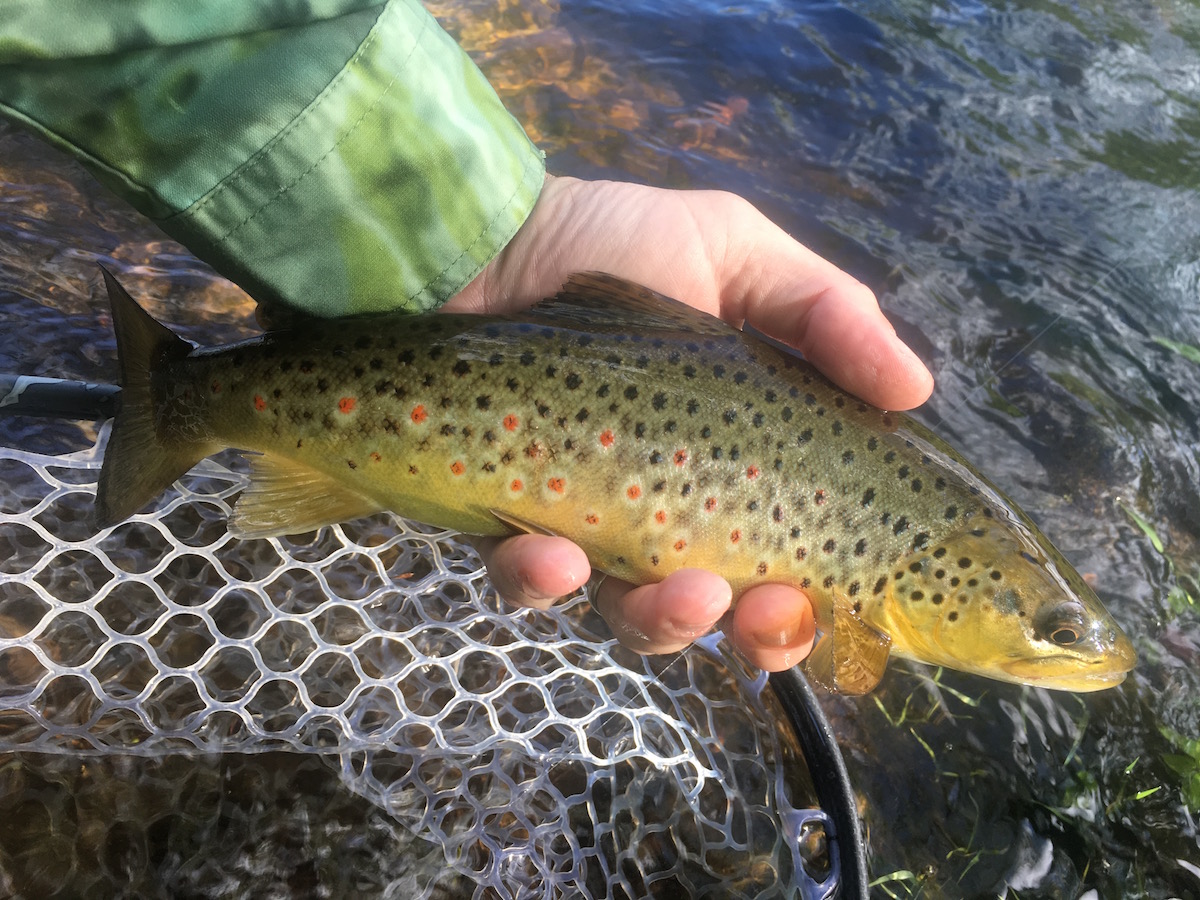Do you still get out to fish? I hear this exact phrase quite a bit these days, even after completing the daunting task of writing a book. Although some harmlessly ask this question, some on the other hand judge other's level of competence with a fly rod on the number of fish pictures on their Instagram feed. Not gonna lie, when I was a bit younger and felt that it was of utmost importance, I too probably judged some of my fellow fisherman. I guess it's human nature, apparently I grew out of it, or maybe I see things a little more clearly as I get older. Whatever it is, I will say this, my level of competence or skill does not have a direct correlation with my "social media feeds". If anything, I post less, enjoy the fish that I catch more, and although I may not fish as much as I did when I was responsibility free, I still like to think that I know my way around a trout stream.
Lately, there has been an ever increasing level of toxicity in social media, so much to the point that I have slowly weened myself off of the need to post content regularly. There is also a higher level of sensitivity out there where it seems as though everyone is hypersensitive to what others say. It is clearly a double edged sword leaving a lot of us confused. Listen, social media is here to stay, it has become a part of pop culture and we all need to embrace it. There are more pro's than con's in my opinion, and it has vastly improved the level of sharing and feeling of community in our little world of Flyfishing. My only real observation is that lately, it seems there is zero filter; some people feel compelled to be nothing but downright disrespectful and nasty. Personally, I prefer people who tell it like it is, I myself try to pride myself on being upfront and honest, but the key is to do so in a tasteful and professional manner.
Tom Bie, editor of the Drake Magazine had a great little piece addressing "Expectation Gaps". In short, Bie put things in perspective; social media as a whole has started a trend of unrealistic expectations and the overuse of certain catchy phrases. Hate to say it folks, but pull back the reigns, and let's ground this thing a bit. Keep it real, and in sight and remember why you Flyfish, big fish are a possibility, not a necessity or commonplace. If these are the expectations you set for yourself, you might want to consider another hobby.
Greg Senyo said it best lately in a podcast with April Vokey, "I don't care what people think, and some of you may not like what I have to say, but I am going to tell you what I think regardless of whether or not it's PC..... Personally, I think we all need to stop being so damn "PC" and tell it like it is".
I couldn't agree more, good, constructive criticism is an extremely valuable tool, so I guess many need to flat out get over it. Let's be real, life isn't always all gum drops and lollipops, more often than not it is full of all sorts of trials and tribulations and obstacles. Good things are built over time, and along the way there are more bumps and bruises, upsets and failures than successes. But, the strong willed persevere and push on.
In that same podcast, April and Greg both talk about the often forgotten "secret ingredient" that everyone who wants to become successful in the Flyfishing industry is after. There truly isn't a secret ingredient folks, it all comes down to pursuing your passion and that old cliche phrase of putting your time in. Hard work, dedication, and experience over time are by far the three key ingredients that will lead to success. After the completion of my book, I fielded more questions from people who like myself are chasing their dreams by making a living out of the sport. It's not easy, I currently juggle two careers, but in short time will have only one, and it will revolve around the sport of Flyfishing. Financially, it may not be a very wise decision, but if it's the quality of life you can have then for certain you will be happy. Without a doubt the three things Greg and April highlighted are some of the biggest pieces of advice one can lend to any of you out there that wish to turn your passion into a profession.
To build on those three very important ingredients, I also think there are some outlying ingredients that will further your success. Although they may sound elementary, for some they may be harder than you think to accomplish. So here's my 2 cents so to speak.
Don't ever hesitate to share the knowledge you've gained over time with others. Every year since I started tying at Flyfishing events I get asked, "why do you put up all those tying videos free of charge?" My answer everytime is simple, "why not?" Never forget where you came from, I always remember those times when I was that new guy to the sport and the many ups and downs and frustrating times I had both on the water and at the vise. If you have something that is going to help out someone regardless of how large or small it may seem to you, by all means do so. We need more people involved in our sport to ensure that our resources are here for future generations to enjoy. Conversely, be your own filter on what you may want to share as it too can have a negative impact as well.
I've learned over time that there are certain things you may want to be a little more guarded about, and they usually hinge around those truly special places you may like to fish. Be sure to share those places with the right people who truly appreciate them and protect them with their best interests, and places like Instagram and Facebook might not be the best places for them. The biggest draw in Flyfishing in my opinion is the sense of wonder and adventure, and some things are meant to be found on ones own accord and not by spreading to the world. I made a vow early on when I began writing articles, I wouldn't entertain the idea of writing about specific fishing locales. It is a very personal decision, but it is one I feel very strongly about and it makes total sense for me.
Advice on how to fish a pattern, a specific type of water or a given hatch is one thing, finding the coordinates to a specific piece of lesser known water is one that should be figured out by the angler or assisted by a guide if you catch my drift. Sometimes, some things are better off left unsaid, and if you want all the answers to everything for that instant gratification, well maybe you should take up another hobby. I'm more apt to give you advice on how to fish a specific pattern, or tie it for that matter, but don't get upset when I won't freely tell you the exact location that I caught that last fish I might have posted on my social media feed; figure it out on your own time and don't judge me for being that way.
Educate yourself frequently, and take the time to listen to what others tell you. You, or I or anyone for that matter do not know it all. I am always learning something new, and in our sport especially the growing process is a constant. Be a humble sponge, stay grounded, question ideas but don't turn your nose to them immediately. If you are suspect of an idea, spend the time to prove or disprove those suspicions on your own, but don't automatically dismiss them as you feel above them or you may not like the source they are coming from. There have been many things over the years that I was both skeptical about or entirely convinced on until I tried them myself, and sometimes I was very much surprised at my own results both good and bad. Never say never.
Do your best to not alienate yourself from others. This believe it or not can be harder than you think at times. We all have things that we may prefer more than others, favorites so to speak. In trout fishing the best example is what way you like to fish. Are you a dry fly only kind of angler, do you prefer to dredge runs with nymphs because it is your best bet at catching fish consistently, or are you the guy who likes to chuck nothing but streamers all day in hopes of tricking a trophy? Remember, although you may prefer one particular thing more than another, others may very well not share your same interests. So before you go pointing fingers, throwing digs or other negativity, always remember that what's good for you isn't always good for everybody. The one great thing about being a trout flyfisherman is we probably have the largest amount of diversity in how we can chase our quarry. You may find like I have that you will periodically change your favorite methods frequently, so never stereotype or alienate your fellow fisherman. I am no angel here folks, I have been "that guy" before and as I have grown older realized just how ignorant I once was in that regard. I now embrace it all, and bounce from method to method several times in a season, why be narrow minded when you can be well rounded.
So my rant is over, I hope some of you found some substance in what I wrote, if not no harm no foul. But maybe give it some thought, I am only speaking on observations from afar, and don't get upset if you see less and less in the social media atmosphere from me, I am hoping to reinvent myself in that realm in the not so distant future.
-RS-



